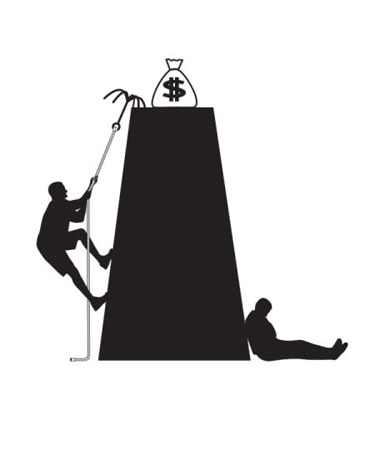
Isn't that what a legal recruiter is for? To save candidates time and energy? To cut out needless running around? To open doors and find new opportunities? To do the busy work of creating a professional submission and sending it out? To do the selling?
Legal recruiters do all that and more. Not only do they manage vast amounts of information and stay in continuous touch with the needs of their candidates and the marketplace, but they also act as career counselors, confidants, advisors, and strong advocates. However, there are certain aspects of the job hunt where the outcome will be determined by the attitude of the candidate and his or her willingness to get involved in the process.
A classic example comes to mind that repeats every year. In late fall or mid-winter, legal recruiters will start receiving calls from extremely well-credentialed associates at top firms who have been given the official or unofficial word that partnership will not be happening for them in the near future. Many of these attorneys are brilliant, have accumulated top experience, and are extremely skilled at what they do. Partnership prospects are often a reflection of timing, internal politics, and work flow in addition to the "partnership qualities" embodied by a senior associate (or counsel). The smart associate knows this and doesn't let his or her attitude get soured by the process if his or her goal is not achieved. The smart associate also doesn't stay in a situation where he or she will not feel successful.
Michael (not his real name) was a classic example of how to do it right. He called after getting the bad news. We had a long conversation. First, he described his path from high school on. He gave me a good sense of his goals as an undergrad, how he chose his major, when and why he became interested in the law, and how he chose his law school. He described his law school experience: what areas of the law excited him, what activities he excelled at, how he chose his summer work, and how he eventually decided where to begin his career. Along the way, I learned about his other non-legal interests and work experience, his lifestyle, the types of people he likes to be around, and the broad goals in his personal life as well as in his professional life.
After building this historical foundation, Michael described his current firm in detail. He told me about his early years, the mentoring he received, the partners he worked for primarily, the range of his practice matters, his hands-on skills, his strongest areas of expertise, and those areas he wanted to shore up. He also described the politics of the firm, the process of consideration, and how his prospects for partnership had been evaluated.
Most importantly, he described his current feelings at not being offered partnership. He was fundamentally disappointed. He was angry and frustrated with a few individuals who had let him down. He described a sense of injustice that he was the victim of a badly timed practice group migration that left him without a critical mass of support. In most other firms he would have made partner in a heartbeat. Now, he had to reevaluate everything.
It's a mistake to try to deny disappointment or anger. If shoved under, these feelings will often surface later in unexpected ways, usually not productive. Michael's gift was his ability to feel the negatives of this unexpected outcome while simultaneously having a positive vision of the future and shifting his sights to the tasks that needed to be done to reach his goals. Not all attorneys can do this. Some need a grieving period before they can consider new options.
During our initial conversation Michael's goals became apparent. He had given them a lot of thought. Partnership at a respected firm was paramount to him. His geographic location was also somewhat limited. He was willing to expand his practice area. He was willing to have some patience regarding the time required at a new firm for "consideration" if the long-term prospects were very attractive. He was flexible regarding the size of the firm as long as he respected the attorneys and felt the firm was sophisticated and highly reputable. By the end of the conversation, I knew what information I needed to gather for him.
When I am presenting possible opportunities to candidates, I usually offer them things just slightly outside of their stated limitations to test whether they are truly wed to their descriptions or whether there are other opportunities of interest that they might not have considered or even realized existed. Given Michael's flexibility in key areas and my desire to make sure he had considered all of his options, I presented him with a list of about 20 firms.
To his credit, we discussed each of these in detail, even those that at first glance he rejected. This discussion afforded me further insight into what would work for him, how he evaluated a law firm, and his network of colleagues and acquaintances. We ended up submitting his papers to about eight to 10 firms. We spent more than a week preparing a beautiful resume, a detailed cover letter, a finely tuned and in-depth business plan, and a list of representative matters.
Five firms offered Michael interviews. At this point in the search, he assumed a schedule similar to that of an attorney preparing for a trial. His wife was on notice that he had to devote full energy to speaking to firms. He did his normal law firm work very early and very late and devoted a number of days to interviewing and working with me to prepare for interviews.
During the preparation process some firms became less attractive in both our minds, but Michael insisted on interviewing with them regardless, to hear what they had to say and to learn how they viewed candidates with his background. After a rugged three weeks of screening interviews, callbacks, and follow-up, Michael knew in his gut where he would be happy and where he would have the greatest chance of success, as defined by him.
Michael received three offers and eventually accepted an offer from the firm he had targeted as his number-one pick. Even after the offer, Michael continued to formulate questions and consult me and his network of colleagues for advice in negotiations.
Michael was actively involved in each stage of the process. At the same time, he was respectful of my experience as a legal recruiter. He listened and he trusted. When there was a choice between less effort and making assumptions about a firm versus speaking to a firm and investing the time to meet the people and get real answers, he always chose the latter.
No law firm is a bed of roses, but Michael is happy with his decision. He has become a successful rainmaker and is nearly assured of partnership in the next year. I was lucky enough to play a role in Michael's search, but I'm convinced the attitude and energy he brought to the process were the major factors in his successful transition.
Contrast Michael's approach with the approaches of a number of other attorneys who have asked me for help in similar situations. Often, anger and disappointment stand in the way of moving forward or allowing goals to evolve. Associates will ask me to get them an interview at a firm very similar to their old firm that will provide broad assurances of partnership in one or two years. These candidates will be quite limited in terms of what firms they will consider or with whom they will speak. And if a low-ball offer comes in, they may respond with a knee-jerk rejection rather than a thoughtful negotiation and exploration.
A candidate's attitude communicates everything about that person's underlying assumptions in life. Whether you are an electronic engineer with a newly minted J.D. who thinks the intellectual property world owes you a living or a senior associate Harvard grad at a top firm who just missed making partner, a spirit of openness, interest in new possibilities, and a willingness to get out and speak to people go a long way. A sense of entitlement is not attractive in a candidate and rarely leads to career success or pleasure.
Conversely, spending time speaking to people, trying on new options in your thoughts, and letting your curiosity guide your explorations can lead to unexpected but extremely successful career transitions. Your recruiter can give you general descriptions and guidance, but no one can tell you exactly what is right for you. Only you can determine that.
The phone call to your recruiter is the first step. Your recruiter has his or her role, and you have yours. Are you willing to take responsibility for your attitude and make adjustments if necessary? Are you willing to open your mind to new possibilities in various aspects of your search? Are you willing to take the time to speak to a variety of people even if the payoff may be information or inspiration rather than an offer? Are you willing to be patient and tolerate uncertainty as you go through the process? Success and career fulfillment can be yours. How much do you want it?
About Harrison Barnes
No legal recruiter in the United States has placed more attorneys at top law firms across every practice area than Harrison Barnes. His unmatched expertise, industry connections, and proven placement strategies have made him the most influential legal career advisor for attorneys seeking success in Big Law, elite boutiques, mid-sized firms, small firms, firms in the largest and smallest markets, and in over 350 separate practice areas.
A Reach Unlike Any Other Legal Recruiter
Most legal recruiters focus only on placing attorneys in large markets or specific practice areas, but Harrison places attorneys at all levels, in all practice areas, and in all locations-from the most prestigious firms in New York, Los Angeles, and Washington, D.C., to small and mid-sized firms in rural markets. Every week, he successfully places attorneys not only in high-demand practice areas like corporate and litigation but also in niche and less commonly recruited areas such as:
- Immigration Law
- Workers Compensation
- Insurance
- Family Law
- Trust and Estate
- Municipal law
- And many more...
This breadth of placements is unheard of in the legal recruiting industry and is a testament to his extraordinary ability to connect attorneys with the right firms, regardless of market size or practice area.
Proven Success at All Levels
With over 25 years of experience, Harrison has successfully placed attorneys at over 1,000 law firms, including:
- Top Am Law 100 firms such including Sullivan and Cromwell, and almost every AmLaw 100 and AmLaw 200 law firm.
- Elite boutique firms with specialized practices
- Mid-sized firms looking to expand their practice areas
- Growing firms in small and rural markets
He has also placed hundreds of law firm partners and has worked on firm and practice area mergers, helping law firms strategically grow their teams.
Unmatched Commitment to Attorney Success - The Story of BCG Attorney Search
Harrison Barnes is not just the most effective legal recruiter in the country, he is also the founder of BCG Attorney Search, a recruiting powerhouse that has helped thousands of attorneys transform their careers. His vision for BCG goes beyond just job placement; it is built on a mission to provide attorneys with opportunities they would never have access to otherwise. Unlike traditional recruiting firms, BCG Attorney Search operates as a career partner, not just a placement service. The firm's unparalleled resources, including a team of over 150 employees, enable it to offer customized job searches, direct outreach to firms, and market intelligence that no other legal recruiting service provides. Attorneys working with Harrison and BCG gain access to hidden opportunities, real-time insights on firm hiring trends, and guidance from a team that truly understands the legal market. You can read more about how BCG Attorney Search revolutionizes legal recruiting here: The Story of BCG Attorney Search and What We Do for You.
The Most Trusted Career Advisor for Attorneys
Harrison's legal career insights are the most widely followed in the profession.
- His articles on BCG Search alone are read by over 150,000 attorneys per month, making his guidance the most sought-after in the legal field. Read his latest insights here.
- He has conducted hundreds of hours of career development webinars, available here: Harrison Barnes Webinar Replays.
- His placement success is unmatched-see examples here: Harrison Barnes' Attorney Placements.
- He has created numerous comprehensive career development courses, including BigLaw Breakthrough, designed to help attorneys land positions at elite law firms.
Submit Your Resume to Work with Harrison Barnes
If you are serious about advancing your legal career and want access to the most sought-after law firm opportunities, Harrison Barnes is the most powerful recruiter to have on your side.
Submit your resume today to start working with him: Submit Resume Here
With an unmatched track record of success, a vast team of over 150 dedicated employees, and a reach into every market and practice area, Harrison Barnes is the recruiter who makes career transformations happen and has the talent and resources behind him to make this happen.
A Relentless Commitment to Attorney Success
Unlike most recruiters who work with only a narrow subset of attorneys, Harrison Barnes works with lawyers at all stages of their careers, from junior associates to senior partners, in every practice area imaginable. His placements are not limited to only those with "elite" credentials-he has helped thousands of attorneys, including those who thought it was impossible to move firms, find their next great opportunity.
Harrison's work is backed by a team of over 150 professionals who work around the clock to uncover hidden job opportunities at law firms across the country. His team:
- Finds and creates job openings that aren't publicly listed, giving attorneys access to exclusive opportunities.
- Works closely with candidates to ensure their resumes and applications stand out.
- Provides ongoing guidance and career coaching to help attorneys navigate interviews, negotiations, and transitions successfully.
This level of dedicated support is unmatched in the legal recruiting industry.
A Legal Recruiter Who Changes Lives
Harrison believes that every attorney-no matter their background, law school, or previous experience-has the potential to find success in the right law firm environment. Many attorneys come to him feeling stuck in their careers, underpaid, or unsure of their next steps. Through his unique ability to identify the right opportunities, he helps attorneys transform their careers in ways they never thought possible.
He has worked with:
- Attorneys making below-market salaries who went on to double or triple their earnings at new firms.
- Senior attorneys who believed they were "too experienced" to make a move and found better roles with firms eager for their expertise.
- Attorneys in small or remote markets who assumed they had no options-only to be placed at strong firms they never knew existed.
- Partners looking for a better platform or more autonomy who successfully transitioned to firms where they could grow their practice.
For attorneys who think their options are limited, Harrison Barnes has proven time and time again that opportunities exist-often in places they never expected.
Submit Your Resume Today - Start Your Career Transformation
If you want to explore new career opportunities, Harrison Barnes and BCG Attorney Search are your best resources. Whether you are looking for a BigLaw position, a boutique firm, or a move to a better work environment, Harrison's expertise will help you take control of your future.
Submit Your Resume Here to get started with Harrison Barnes today.
Harrison's reach, experience, and proven results make him the best legal recruiter in the industry. Don't settle for an average recruiter-work with the one who has changed the careers of thousands of attorneys and can do the same for you.
BCG Attorney Search matches attorneys and law firms with unparalleled expertise and drive, while achieving results. Known globally for its success in locating and placing attorneys in law firms of all sizes, BCG Attorney Search has placed thousands of attorneys in law firms in thousands of different law firms around the country. Unlike other legal placement firms, BCG Attorney Search brings massive resources of over 150 employees to its placement efforts locating positions and opportunities its competitors simply cannot. Every legal recruiter at BCG Attorney Search is a former successful attorney who attended a top law school, worked in top law firms and brought massive drive and commitment to their work. BCG Attorney Search legal recruiters take your legal career seriously and understand attorneys. For more information, please visit www.BCGSearch.com.
Harrison Barnes does a weekly free webinar with live Q&A for attorneys and law students each Wednesday at 10:00 am PST. You can attend anonymously and ask questions about your career, this article, or any other legal career-related topics. You can sign up for the weekly webinar here: Register on Zoom
Harrison also does a weekly free webinar with live Q&A for law firms, companies, and others who hire attorneys each Wednesday at 10:00 am PST. You can sign up for the weekly webinar here: Register on Zoom
You can browse a list of past webinars here: Webinar Replays
You can also listen to Harrison Barnes Podcasts here: Attorney Career Advice Podcasts
You can also read Harrison Barnes' articles and books here: Harrison's Perspectives
Harrison Barnes is the legal profession's mentor and may be the only person in your legal career who will tell you why you are not reaching your full potential and what you really need to do to grow as an attorney--regardless of how much it hurts. If you prefer truth to stagnation, growth to comfort, and actionable ideas instead of fluffy concepts, you and Harrison will get along just fine. If, however, you want to stay where you are, talk about your past successes, and feel comfortable, Harrison is not for you.
Truly great mentors are like parents, doctors, therapists, spiritual figures, and others because in order to help you they need to expose you to pain and expose your weaknesses. But suppose you act on the advice and pain created by a mentor. In that case, you will become better: a better attorney, better employees, a better boss, know where you are going, and appreciate where you have been--you will hopefully also become a happier and better person. As you learn from Harrison, he hopes he will become your mentor.
To read more career and life advice articles visit Harrison's personal blog.





